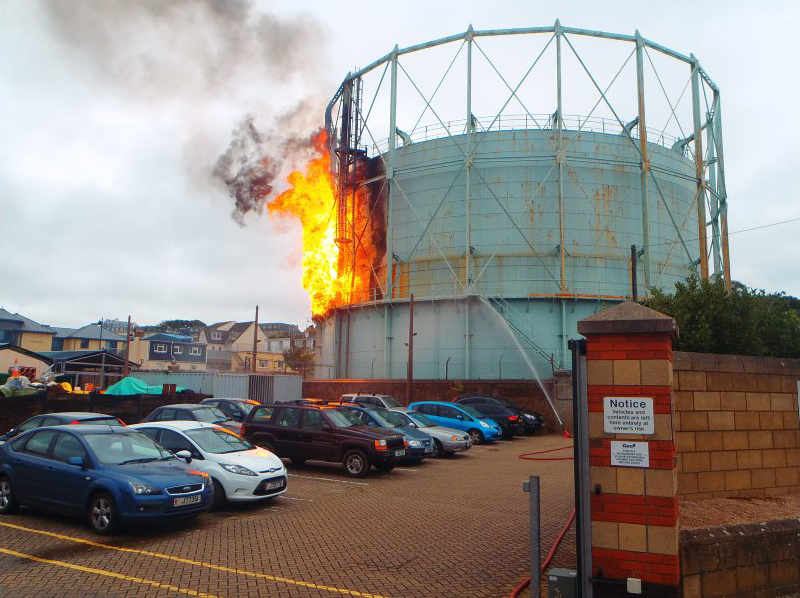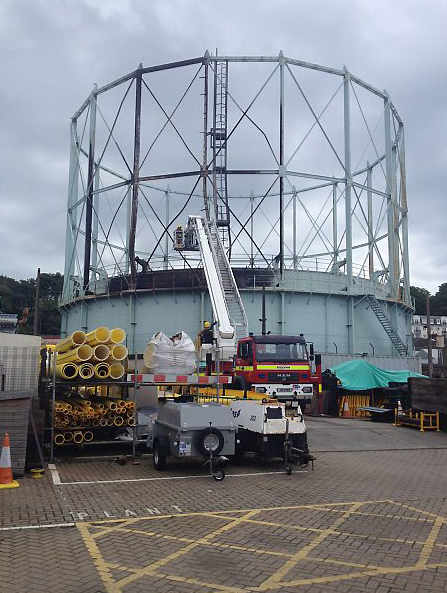David Ovens (51), who lives with his mother Barbara, were left ‘confused and worried’ when they received a quarterly gas bill which came to more than £1,000.
The pair, who live in St Peter, say that they only use a small amount of gas to heat their home and have had a number of energy-efficiency systems fitted. But despite that, their winter bills have been getting ‘higher and higher’ over the last few years.
Mr Ovens said that they had been frugal with their gas usage and their water is heated only once a day, leaving them with a ‘lukewarm’ supply for most of the morning.
‘I just cannot understand how they can charge £1,001.88,’ Mr Ovens said. ‘We have had the Jersey Gas engineer out to check the boiler, which he says is OK, and we have had the meter read three times in two days, but it is now due to be sent off for official testing.’
Mrs Ovens (76), who has Parkinson’s disease, said: ‘I am really worried. If this is just one bill, what is the next one going to get up to? I am scared of using the heating and it should not have to be like that. You should be able to enjoy your life when you retire.’
The news comes after Deputy Geoff Southern called for the States to intervene and reduce Jersey Gas’s domestic tariffs by five per cent. The Deputy said that the ‘rampant growth’ in the cost of heating has had the greatest impact on the elderly and that Islanders had faced increases in gas prices five times since 2011.
He also claimed that by August 2014, domestic tariffs had risen by 32.4 per cent over a four-year period.
Mr Ovens said that he was fully supportive of Deputy Southern’s proposition, but believes it will not be passed because not many people are willing to speak out about the issue.
A spokesman for Jersey Gas said that Islanders’ bills depended on individual circumstances, adding: ‘Older boilers are less efficient, properties are built differently and therefore have different levels of insulation, and some householders are at work all day whereas those with young children or pensioners will have a higher usage.
‘We encourage customers to pay a monthly standing order to smooth their payments throughout the year.’
He added that Jersey Gas’s parent company, International Energy Group, would be interested in talking to the States about setting up a ‘fuel hardship’ scheme, which is currently available in the Isle of Man and Guernsey.
Age Concern Jersey, which supports older members of the community, warned last November that many pensioners would have to choose between ‘heating and eating’ over the winter.
Deputy Southern’s proposition is due to be discussed in the States on 14 April.

THE chaos began at 12.36 pm the previous day, when the Fire and Rescue Service received a report of ‘LPG gas alight at Tunnell Street’.
Four minutes later, a full-scale emergency operation was rolled out when the first crew on the scene delivered the message: ‘Large gas holder well alight’.

As a wall of flames reaching 350°C began to pour out of the giant structure, which was holding 380,000 cubic feet of gas, firefighters were faced with the dilemma of how to control the blaze while ensuring that the huge tank did not collapse.
The tank is effectively like a giant balloon of gas sitting on a pool of water, and moves up and down on vertical guides and runners depending on how much gas it has in it.
A plan was put in to place to cool the structure, control the flames and allow the gas to burn off naturally while the tank slowly dropped down.
But the plan had potential problems.
Chief fire officer Mark James said: ‘There were three major concerns. ‘If the walls had become too hot they would have split open and there would have been a huge release of gas and a gas cloud would have formed. This undoubtedly would have ignited and there would have been a fireball.
‘This was the initial concern. ‘After we managed to control the fire other concerns came into play and we became concerned about what would happen if the runners which the structure sits on became so distorted it could no longer drop down.
‘If this had happened, there would have either been a drop in pressure inside the tank and the flame could have got sucked inside, in which case, the tank would have blown up.
‘Or, it could have resulted in a collapse of the tank, which would have resulted in a massive leak of gas and a gas cloud would have formed and this would have ignited and caused a fireball.
‘It was essential that we simply quelled the fire and cooled the structure while allowing the gas to burn off and the lid to naturally drop down until the leak area was below the water seal and so could no longer escape.’
He added: ‘If the top had not dropped down we would have faced a nightmare situation where we would have had to extinguish the blaze and someone would have had to fix the leak while the incident was on going. There would have been huge risks involved in that.’
The firefighters, who have been widely praised for the rapid response, quickly cooled the structure by training monitors – unmanned pumps – onto to the outside.
And for much of the day, the tank slowly dropped as the gas naturally burned off. But by midnight, the team began to encounter problems.

‘As more gas burned off, the rate of drop slowed dramatically and by midnight it was dropping by only one or two inches per hour. If this had gone on, the cordon would have had to stay in place for the whole of the following day and possibly into the night as well. ‘This is when we came up with the Crematorium idea. ‘By this stage we were satisfied that the structure was intact and wasn’t going to collapse so we decided to turn on the booster pumps for one minute to pump the gas into the town mains supply to increase the drop.
‘We had extra firefighters and extra water jets on standby.
‘It went okay but we had a problem – it was the middle of the night in the middle of summer and very few people were using gas so we would have quickly been in a position where the mains supply would have been full.
‘So the Crematorium was fired up at 2 am and the tank soon began dropping by six inches every half an hour.
‘We were also told that a bakery was about to turn on their ovens and so this helped too.
‘By 5.10 am the split in the tank had dropped below the water seal and the fire had gone out.’
JERSEY’S fuel market is a wildly erratic, shadowy and frustrating beast. Before Christmas, the price of petrol, thanks in part to a promotion by the Jersey Evening Post and Motor Mall, fell to below £1 a litre.
Within days, and fuelled by other retailers such as the Co-op, the cost of motoring had been driven down to its lowest level for years.
A competitive market was working. And yet questions remain about the monopoly position enjoyed by wholesaler Rubis, the owners of the Island’s fuel farm, and their disproportionate influence on the deal consumers get at the pumps.
In January the spotlight wa thrown on gas and electricity price after a major UK gas supplier bowed to political and public pressure to cut bills in the wake of falling oil prices.
The comparison between the two sectors shows just how crazy the Island’s fuel market is.
As has been reported by the JEP and verified by the Jersey Consumer Council, Islanders benefit from some of the lowest electricity prices in Europe, with bills insulated from fluctuations in oil prices because of our overwhelming reliance on nuclear energy sourced from the Continent.
Gas, however, is a totally different story for several reasons.

For a start, gas prices in Jersey are some of the highest in Europe. That situation is compounded by the fact that whereas Jersey Electric, a publicly owned utility, publishes its accounts for all to see, Jersey Gas is a closed shop owned by an Australian fund.
So why have gas prices not come down here as they have in the UK?
Jersey Gas says that it buys in advance so cannot respond quickly to changes in world prices.
That argument will not resonate with consumers who have seen prices rise for years in line with increases in the cost of oil.
Since January 2013, oil prices have been falling and yet gas bills have continued on their upward trajectory.
Something is wrong and Islanders are paying the price. The closed local market is failing consumers. CICRA, the islands’ competition regulator, must investigate the fuel market and use its teeth to force the issue.
But that is not the public’s trump card. Article 93 of the Jersey Gas Company Law, a little-known statute from 1989, gives the States the power to step in and regulate prices if it is in the public interest to do so.
That time must surely have come.







